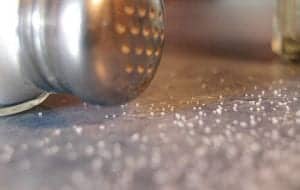There are few things more annoying than waking up in the middle of the night to use the bathroom. What’s even more frustrating is making multiple nightly trips to urinate. This is called nocturia, a condition that causes people, typically 60 years of age or older, to take several trips to the bathroom during the night.
Researchers from Nagasaki University in Japan now believe that those late-night frequent bathroom trips might be due to a high intake of sodium. They presented their findings at the European Association of Urology Congress conference in London.

“Night-time urination is a real problem for many people, especially as they get older,” said Matsuo Tomohiro, leader of the scientific team at Nagasaki University. “This work holds out the possibility that a simple dietary modification might significantly improve the quality of life for many people.”
While Americans get some of their daily sodium intake at the dinner table, as they shake extra salt on their meals, the majority comes from prepackaged and processed foods.
Those types of foods, along with meals from restaurants, account for 75 percent of the daily sodium intake in the American diet, according to the Centers for Disease Control and Prevention (CDC).
Government statistics show that the average American consumes more than 3,400 milligrams (mg) of sodium each day. The recommended amount is 2,300 mg.
Related: When You Eat May Be as Important as What You Eat
Nocturia not only disrupts a good night’s sleep — which can cause sleep-related conditions like sleep apnea — but also could signal other underlying health problems such as diabetes or cardiovascular disease.
The researchers studied 300 volunteers who all previously reported high salt intake and sleep-related problems. They asked 200 participants to reduce their daily sodium consumption, while the other 100 volunteers were asked to increase their salt intake at night. Both groups were monitored for three months.
The first group of volunteers reported a decrease in the frequency of their nightly bathroom trips, dropping from 2.3 times a night to just 1.4. Their reduced sodium intake also decreased the amount of times they urinated during the day. These participants reported that their overall quality of life improved as well.
The second group of volunteers said that after consuming more salt at night, their bathroom trips to urinate increased from 2.3 to 2.7 times nightly.
Related: Prebiotics May Improve Sleep and Relieve Stress, Study Says
However, many experts say the cause of nocturia goes further than just sodium consumption. Professor Marcus Drake, a nocturia expert from the University of Bristol in the United Kingdom, explained to the BBC that doctors typically first focus on the amount of water patients drank before going to to bed, as well as bladder and prostate problems for men.
“Here we have a useful study showing how we need to consider all influences to get the best chance of improving the symptom,” Drake said.
This is the first study to link high sodium intake with nocturia, and additional research is still required to verify these findings.
Danielle Tarasiuk is a multimedia journalist based in Los Angeles. Her work has been published on AllDay.com, Yahoo! Sports, KCET, and NPR-affiliate stations KPCC and KCRW. She’s a proud Sarah Lawrence College and USC Annenberg alumn.


![How To: ‘Fix’ Crepey Skin [Watch]](https://cdn.vitalupdates.com/wp-content/uploads/2017/05/bhmdad.png)












